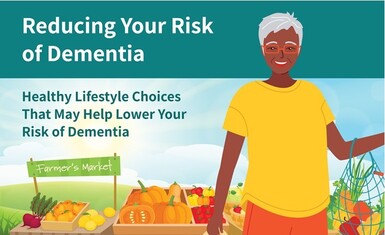|
When the level of care needed by an ailing or elder person exceeds what can be provided at home, residential housing is often a next step. But how do you sort through the variety of options available and choose the correct level of care?
Family Caregiver Alliance's infographic “5 Types of Residential Care” reveals the five types of outside-the-home care found in most urban and suburban communities, and what to expect from each. Learn which options are best suited for an individual’s wants or needs, including:
1 Comment
If you or someone you know is experiencing a mental or behavioral health crisis, free help is immediately available.
The 988 Suicide and Crisis Lifeline is available 24 hours per day, 7 days per week, via phone, text and online chat, offering people compassionate care and support from trained crisis counselors for individuals, families or their loved ones. One does not have to be suicidal to call 988 but can reach out when experiencing any behavioral health crisis. 988 call services are available in English and Spanish, along with interpretation services in more than 150 languages. Texting 988 and online chat are currently available only in English. Veterans and military service members can call 988 and press “1” to connect with the Veterans Crisis Line. Pain is a signal that something may be wrong in your body. You’ve probably been in pain at one time or another but found that it often goes away as the body heals or with treatment. However, many older people may have ongoing pain from health problems like arthritis, diabetes, shingles, or cancer.
A few things you can do to help manage your pain and feel better are:
The National Institute for Aging has released an informative booklet discussing different aspects of pain experienced by older adults. To view the booklet, click the button below. If you have older family members or loved ones, you may worry about their health as they age. Aging increases the risk of chronic diseases such as heart disease, type 2 diabetes, arthritis, cancer, and dementia. The good news is that adopting and maintaining a few key behaviors can help older adults live longer, healthier lives. As a family member, it’s important to encourage healthy lifestyle behaviors in your loved ones — it’s never too late to start!
For tips on healthy aging, click the button below. Deciding to become physically active can be one of the best things you can do for your health. Exercise and physical activity are not only great for your mental and physical health, but they can help keep you independent as you age.
To learn more, click the button below. Answering the question “what should I eat?” doesn’t need to leave you feeling baffled and frustrated. In fact, when you have the right information and motivation, you can feel good about making healthy choices. Simple adjustments can go a long way toward building a healthier eating pattern.
Click the button below for tips to plan healthy and delicious meals.  Exposure to social stress was associated with accelerated aging of the immune system, according to an NIA-funded study recently published in PNAS. The body’s immune system changes as people age, and there’s large variability in these changes. The study, led by researchers at UCLA, investigated whether social stressors added to immune system decline. To learn more, click the button below.  Many factors may influence your risk of dementia, including genes, environment, and lifestyle. You can’t change some factors, but, as with many diseases, there may be steps you can take to help lower your risk. Learn more about how leading a healthy lifestyle is important for your health. To learn more, click the button below. If you do not see an aging friend or relative often, changes in his or her health may seem dramatic. In contrast, the primary caregiver might not notice such changes or realize that more help, medical treatment, or supervision is needed. Or, the primary caregiver might not want to accept the fact that the health of his or her spouse or parent is failing.
As a caregiver, you can provide support by helping an aging friend or relative get the care they need. To learn more, click the button below. The University of Washington Dementia Palliative Education Network and the WA State Dementia Action Collaborative have created a new free toolkit for family/friend care partners of people living with dementia.
The goal of this toolkit is to:
The toolkit includes:
For more information about the toolkit, click here. To view the flyer, click the button below. If you don’t see an aging parent or friend often, changes in their memory and function may seem dramatic. In contrast, a primary caregiver like a spouse might not notice such changes or realize that more help, medical treatment, or supervision is needed. Talk with your loved one and the primary caregiver about your concerns. Consider these conversation tips:
 Three in four adults more than 65 years of age have two or more chronic conditions that can limit day-to-day functioning. If an older adult is not able to grocery shop or cook meals, these tasks fall on the caregiver. In 2015, 76% of caregivers helped their loved one with grocery shopping and 61% helped with cooking meals. As a result, the caregiver’s dietary habits will impact their loved one’s diet. In other words, if the caregiver eats poorly (non-nutritious foods), so will their loved one, typically resulting in poorer health. Click the button below to learn more from Oklahoma State University's Extension Program... Shadow comforts and quick fixes deplete and exhaust.
Check out these ten ways to solve the self-care conundrum. Family caregivers, long the backbone of the country’s long-term care system, are increasingly tapping public and private resources to get paid for caring for loved ones. During the pandemic, Sheila D. Johnson, 55 years old, of Richmond, Va., couldn’t get skilled nurses to help with her brother, Kevin McCain, who is paralyzed and lives with her. She had to quit her job to take care of him. “I still needed to work and have income so I decided I might as well try to get paid,” says Ms. Johnson, who began researching and found a Medicaid program that would allow her to earn income for providing care. - Wall Street Journal
"Delirium is a sudden change in your alertness and thinking. People with delirium typically become confused and have trouble paying attention."
Healthline's Chitra Badii continues, "Delirium is an abrupt change to your mental state. It makes it difficult to think, remember, focus, and more. Some people with delirium become drowsy and quiet, while others can become agitated." Badii expands her article to cover:
For all that’s been said about the pandemic, we should be talking more about its impact on family caregivers – especially caregivers who are now returning to the workplace.
Millions of people fall into this group. Seven out of every 10 U.S. workers provide some form of care, often at personal cost. And now, more than two years into the COVID-19 pandemic, they face new challenges as they increasingly spend more time back in the office. Click the button below to read more. Build drinking water into your routine.
The guide walks through four steps to fighting elder financial abuse: prevent, recognize, record, and report. It lists red flags to watch for, shares some common scenarios, and includes resources you can use to help your loved one.
Click below to download the new Spanish version or the English version of the guide for free. Consumer Financial Protection Bureau Prevent foodborne illness during emergencies and disasters.
Check out these Resource Materials from USDA's Food and Nutrition Service. Any pharmacy in Oregon can make an emergency prescription refill for a person who had to leave an area affected by a declared disaster.
|
Caregiver
Whether in a medical professional setting or personal homes, Caregivers are caring and caring takes energy, wisdom and compassion. This Caregiver Blog is here to give you insight, encouragement and tools, not just to give care but to survive and thrive while doing it. Archives
July 2023
Categories
All
|
 RSS Feed
RSS Feed
